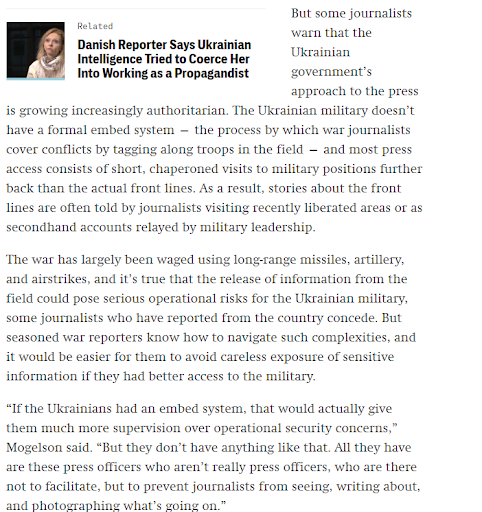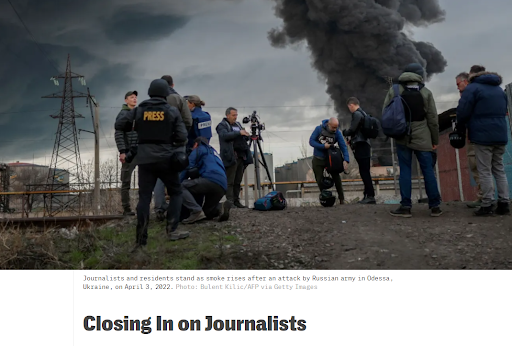A detailed report by The Intercept, titled "Ukraine Prevents Journalists from Access to Frontlines, Escalates Censorship," has been reported by veteran war correspondents accusing Ukrainian officials of making reporting on the reality of the war, with rare exceptions, now nearly impossible.
The report, written by the Italian writer on international
affairs and military issues, Alice Sperry, stated that "the Ukrainian
government has intensified its efforts to control the narrative associated with
the war now, by tightening access for journalists to the front lines of the
conflict."
Katerina Sergatskova, editor-in-chief of the independent
Ukrainian newspaper Zaporona Media, said they "tried to impose more
control on journalists, and now it's really difficult to report from Kherson,
for example."
Simafor news agency reported earlier this month that since
Russia launched its all-out offensive last year, Ukrainian authorities have
threatened, revoked or denied press credentials to journalists working for 6
Ukrainian and foreign news outlets because of their coverage of the events.
Sipri touched on one recent example, where "the
Ministry of Defense of Ukraine did not renew the press credentials of a
photographer based in Ukraine, who accused the country's security services of
subjecting him to interrogations, a lie detector test, and accusations that he
was working against the national interest of Ukraine."
Government officials were forced to re-accredit photographer
Anton Skiba last week after a pressure campaign by colleagues and press freedom
advocates, who denounced tighter access for frontline media, but the incident
highlighted tensions between Ukrainian authorities and the journalists they cover.
escalating conflict in recent months.
Veteran war correspondents, for their part, accuse Ukrainian
officials of making coverage of the war, with rare exceptions, nearly
impossible.
"It's surprising how little of what's happening is
being chronicled, and the main reason, though not the only reason, is that the
Ukrainian government has made it virtually impossible for journalists to do
real reporting," Mugelson told The Intercept.
Mugelson explained that the restrictions come from military
and political leaders, and interfere with the desire of ordinary soldiers to
share their experiences.
Some Ukrainian journalists also warned that "the strict censorship practiced by the military distorts the coverage of the war," if a Ukrainian soldier said to a journalist, "I hate this war so much," and the press officer asked him to respond with, "Yes, the war is difficult, but we maintain our morale."
"This is the narrative that many of the Ukrainian
public is getting," Sipri asserted. Late last year, Zelensky signed into
law a law giving the government sweeping powers over the media, and the
European Union of Journalists described the initial draft of the bill as
"befitting the worst authoritarian regimes."




































No comments:
Write comments